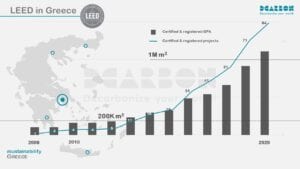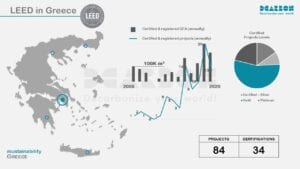- test :
Over the last decade Greece suffered an unprecedently harsh economic recession. During this time all major economic sectors were severely impacted, with the construction industry almost collapsed and the real estate facing total brown discount.
However, this time proved a great chance for the forefront of real estate to focus on establishing a globally approved sustainability identity. Shifting from the traditional model of real estate development which used to analyze cost only, a new integrative approach emerged. The first ever LEED project in Greece was completed by Dimand setting a new milestone for local real estate.

Cumulative data since the first LEED project registration in 2008 up to 2020 by Gross Floor Area and number of projects
That got us thinking. It’s true that money is the undercurrent of all transactions in real estate. But without effective sustainability and resilience strategies in place, the vast sums already invested in the built environment—as well as capital in various stages of planning for future investments—become threatened as the risks of climate change grow.
Hence, the demand for green buildings in Greece is rising exponentially. More importantly, this increase is market-driven aligning with the global trends of real estate. As of today, assets in Greece (primarily in Athens), with a GFA far exceeding 1,000,000 m2, have pursued sustainability certification using the most robust international rating system, LEED. The local green building movement is maturing, and a deeper understanding of the ‘triple bottom line’ value of green buildings is emerging, shifting the emphasis from ‘profit to ‘people’ and ‘planet’. The conversation is already geared around how green projects will deliver not only on economic priorities such as return on investment and risk mitigation but also on social priorities such as employee productivity, health & wellbeing.

Annual data by Gross Floor Area and number of projects and certification level statistics.
We are already within a transformational framework. Sustainable buildings are not simply the result of an assessment methodology: they are a trojan horse for engagement and leadership. Sustainable buildings are a hot topic in the next wave in Environmental, Social and Governance (ESG) investing, in anticipation of the EU directive which will require that all new projects built are environmentally responsible.

